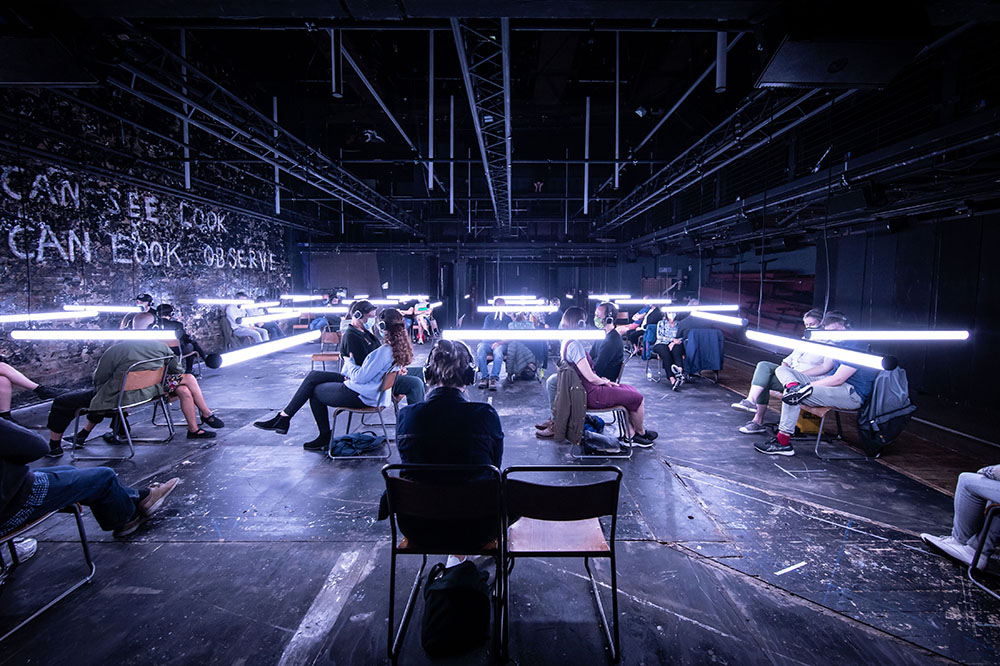Culture
 "Blindness" at the Donmar Warehouse. Photo by Helen Maybanks.
"Blindness" at the Donmar Warehouse. Photo by Helen Maybanks.
Live for the First Time in a Year, “Blindness” Comes to Shakespeare Theatre Company
April 28, 2021 @ 11:54am
In May, the Shakespeare Theatre Company (STC) will bring audiences back to Sidney Harman Hall for the first time during the pandemic, only there will be no actors. Instead, the audience will take the stage for “Blindness,” an adaptation of the José Saramago novel by playwright Simon Stephens and performed by Juliet Stevenson, known for roles such as her BAFTA-nominated performance in “Madly, Truly, Deeply (1992).”
The story takes place in an unknown city beset by an epidemic of vision loss. Stevenson voices an optician’s wife who, immune to the contagion, has to lead her now-blind husband and his patients through the apocalyptic scenario.
In a staging that looks as much like an art installation, showgoers sit six feet apart beneath an array of lights that change with the plot. Like the characters in the story, they don’t see Stevenson, but only experience her voice through a set of binaural (3D) headphones provided by the theatre. The classically-trained British actress says she’s never been a part of anything like it in her forty-year career.
“Without being too boastful,” Stevenson says, “I don’t think there’s been anything like this before.”
She highlights how the 3D headphone technology in particular guided her performance.
“Knowing that each audience member will have a pair of headphones on, if you come close and whisper, you’re whispering to them, and you have to decide who they are in the narrative.”
For STC Artistic Director Simon Godwin, the installation-like elements lend a visceral effect to the play.
“We’ve lived tremendously cerebral lives on our computers,” Godwin says, “the small number of people that we’ve seen and that’s it. Our space has been very contained and this is about opening those up and undergoing experiences.”
The show comes to the F Street theatre after showings in New York and London, where it was produced by Donmar Warehouse. Godwin first heard of the play when in London early in the pandemic. He was filming a version of “Romeo and Juliet” and didn’t see “Blindness” then, but back in Washington, he heard the recording. The material moved him and he saw the staging as a clever way to reintroduce audiences to the theatre.
“I was struck by the ingenuity of the concept, as well as the poignant relevance of the material, and the coming together of concept and form,” he says.
Stevenson is of course not physically present in the performance, but Godwin is excited for showgoers to re-experience how a live audience lifts and intensifies a performance.
For her part, Stevenson thought the material was on the nose. They conceived of the show before the pandemic and originally considered it a metaphor for Brexit fever.
“Tearing apart families, communities, friendships, and alliances as it did, creating havoc and destroying what this country had felt itself to have been built on,” Stevenson explains of the initial connection.
But, during Covid, she thought a play about one virus while experiencing another might be a bit much. She revised her thinking though when she saw how audiences reacted.
“People were amazed to come to this show during lockdown and find that they were listening to something reflective of their own recent lives, particularly in that this crisis of personal affliction is communally felt and experienced,” she says.
The epidemic in “Blindness” is starker than the one we are currently experiencing; for example, Stevenson’s character becomes an Amazonian creature fighting for her tribe. But parallels to current events lie in what the characters discover about themselves.
“She discovers in herself extraordinary qualities that her life, if this had never happened, would never have revealed.”
She caveats this by saying that some might interpret her character as more feral than heroic. The emergence of new socio-political structures in “Blindness” also resonates today.
“The piece finishes with this sense of a new world that might be possible, that through the destruction of so much that we might be able to forge a different way of being. People were very hopeful about that,” Stevenson notes.
“Blindness” runs May 1 – June 13 at Sidney Harman Hall. Shows last 70 minutes and tickets must be bought in pairs. Various ticket prices. Visit www.shakespearetheatre.org and follow @shakespeareindc on Instagram for more information and to purchase tickets.
Shakespeare Theatre Company’s Sidney Harman Hall: 610 F St. NW, DC; 202-547-1122
Enjoy this piece? Consider becoming a member for access to our premium digital content. Support local journalism and start your membership today.







